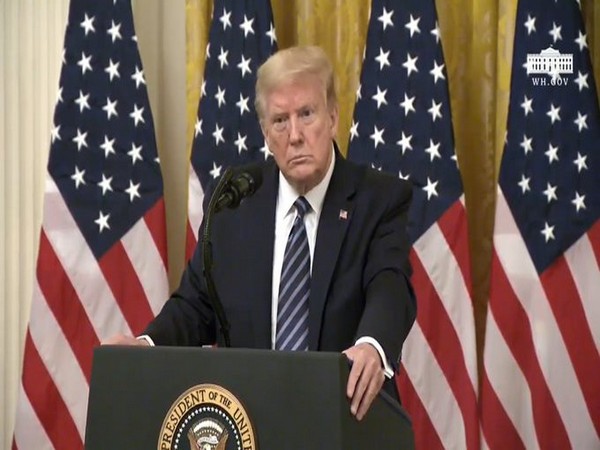Trump's surprising target in war on media: Voice of America

- Country:
- United States
President Donald Trump' has had many targets in his war against the media, but perhaps none is more surprising than the Voice of America, the venerable US-funded institution created during World War II to broadcast independent news and promote American values to the world. Trump and his supporters have accused the outlet of “disgraceful” reporting and are now pushing hard to install their choice to run the government agency that oversees VOA and its affiliates. That battle is about to hit Congress, where partisan lines have been drawn amid a debate that could have a significant impact on the future of the global broadcaster.
Over the objections of Democrats, the Senate Foreign Relations Committee plans Thursday to vote on Trump's nominee to head the U.S. Agency for Global Media, which runs VOA and its sister outlets like Radio Free Asia, Radio Free Europe/Radio Liberty and the Cuba-focused Radio Marti. The Republican-controlled committee is expected to vote on party lines to advance the nomination. Democrats fear that candidate, conservative filmmaker and former educator Michael Pack, could turn the organization into a Trump propaganda machine funded with more than $200 million a year in taxpayer money. Trump has mused about his desire to control a media outlet. At his confirmation hearing last September, Pack dismissed concerns he would allow that to happen, but the recent furor has reignited those concerns.
The spat has dismayed many who watch U.S. international broadcasting closely, including some who believe the USAGM and VOA are in need of reform, particularly as changes to the agency's governing rules mean its next chief will be able to bypass its board in making personnel and policy decisions. “All of this is a distraction from what I think is a legitimate debate about what its role should be,” said Tom Kent, a former Associated Press editor who went on to head Radio Free Europe/Radio Liberty. “It needs to be clear whether VOA's role is to advocate for democracy and American values in general or whether it is supposed to be a PR agent for the president and the State Department on current issues.” The White House did not respond to inquiries about Pack's nomination or the VOA controversy.
The Democrats' stated objections to Pack, a one-time associate of former Trump adviser Steve Bannon who used to work for the conservative Claremont Institute in California, center in part on his refusal to answer questions about his previous business dealings. Yet, the uproar among conservatives over Voice of America and its recent coverage of China's handling of the coronavirus pandemic is likely to feature prominently in GOP support for Pack's confirmation. It has become a touchstone in the Trump administration's efforts to criticize Chinese authorities for the outbreak and deflect criticism of the U.S. response as the 2020 presidential campaign heats up.
Trump and his allies have long viewed VOA and some of its affiliates with suspicion, regarding them as elements of a “deep state” that is trying to thwart their policies. But the hostility burst into the open April 9 when Trump communications adviser Dan Scavino posted a VOA story about China to his official Twitter account with the comment “American taxpayers—paying for China's very own propaganda, via the U.S. Government-funded Voice of America! DISGRACE!!” The story that VOA posted was actually an Associated Press report, but the following day, an official White House publication accused VOA of using taxpayer money “to speak for authoritarian regimes” because it had covered the lifting of the lockdown in the Chinese city of Wuhan, where the new coronavirus first emerged. Trump weighed in days later, calling VOA's coverage “disgusting” and demanding that the Senate confirm Pack. VOA's director Amanda Bennett fired back. "One of the big differences between publicly funded independent media, like the Voice of America, and state-controlled media is that we are free to show all sides of an issue and are actually mandated to do so by law as stated in the VOA Charter,” she said in a statement on April 10.
But VOA's overseers stayed silent. A representative of the State Department, which holds a seat on the USAGM board, advised the agency to avoid doing anything that would appear to endorse Bennett's response, which it did, according to three people familiar with the matter. And, an April 14 virtual meeting of the USAGM board came to no conclusion about how, or if, to respond, according to those people who were not authorized to discuss the meeting publicly and spoke on condition of anonymity.
“All USAGM networks, including VOA, know they have the full support of the agency," the agency's current CEO Grant Turner said in an email statement provided to AP. "We have, and will continue to serve the American public by staying true to our mission — informing, engaging and connecting our audiences in support of freedom and democracy.” Bennett, meanwhile, sent a note of encouragement to VOA staffers on Monday, urging them to remain professional amidst what she termed “uncomfortable” scrutiny.
(This story has not been edited by Devdiscourse staff and is auto-generated from a syndicated feed.)
ALSO READ
US raises commercial and market access issues with China in meeting
US, Philippines, Japan to tackle South China Sea incidents in trilateral summit, says Manila official
US Treasury Secretary Yellen meets foreign business leaders in China ahead of trade talks
US, Philippines, Japan to tackle South China Sea incidents in trilateral summit, says Manila official
US, Philippines, Japan to tackle South China Sea row in summit










